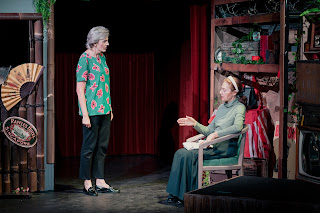The Shoe-Horn Sonata.
Writer John Misto. Director Lexi Sekuless. Sound Designer and
Composer: Leisa Keen Production Designer: Annette Sharpe. Lighting Designer:
Jennifer Wright. Production Stage Manager: Katerina Smalley. Production
Photography and Film: Daniel Abroguena. Interviewer voice: Timmy Sekuless Set
Construction: Simon Grist. Publicity Photographer: Robert Coppa. Publicity Hair
and Makeup: Vicky Hayes. Producer: Lexi Sekuless Productions. Major
partner: Elite Event Technology. Mill Theatre, Building 3.3, 1 Dairy Road,
Fyshwick. April 10 – 27. Bookings: Tickets $40 to $50, from Humanitix. 2024
 |
| Andrea Close as Bridie and Zsuzsi Soboslay as Sheila in Lexi Sekuless's production of The Shoe-Horn Sonata |
As the war in the Pacific was drawing to a close, the Japanese released survivors from the dreaded Belalau Camp in the dense jungle of Sumatra. They left behind the dying and the dead women who had been imprisoned in brutal and inhumane conditions since the fall of Singapore in 1942. It is a dark and terrifying chapter in the history of Japanese occupation and a shameful record of the failure of allied governments, Australian and British to acknowledge and publicly recognize the atrocities enacted upon their citizens.
The play is set in 1995 in a TV studio and a hotel room. Annette Sharpe’s
eclectic design of memorabilia includes a large Japanese flag, a poster of Kitchener
from the First World War, television monitors and the bed in the hotel room. It
is functional, unostentatious and unobtrusive. Two survivors of the Belalau
Camp have been invited to take part in a documentary about their time in the
prison camp. Chatswood born and bred Bridie Cartwright (Andrea Close) is a
tough, outspoken, straight-talking former Australian Army nurse. Sheila Edwards
(Zsuzsi Soboslay) was a 15 year old British schoolgirl at the time of her
incarceration and at the time of the documentary works as a librarian in Perth.
It comes as a shock to Bridie who thought that Sheila had returned to England
after the emancipation. Their surprise reunion after fifty years unearths
tensions and secrets as they face their interviewer Rick (the voice of Tim
Sekuless). In the hotel room accusations fly. The difference in the two women
fuels the tensions as each struggles to reconcile their past close and
interdependent relationship with the present impact of a fifty year separation.
Sekuless directs the shifting relationship and revelations from the live
interview to the televised appearances to the hotel room with gripping clarity
and superb pacing. Misto’s dialogue has the authenticity and intensity of
verbatim theatre. Each performer embraces character and circumstance with an
honesty that makes their performance riveting.
It can often be a cliché to say a piece of theatre is not to be missed.
In this instance it is imperative that Misto’s The
Shoehorn Sonata plays to packed
houses over its all too short season. This is not only because of its importance
in righting the historical wrong of political indifference but also because of
the opportunity to see a production of The
Shoe-Horn Sonata that is uplifting
and unforgettable.


